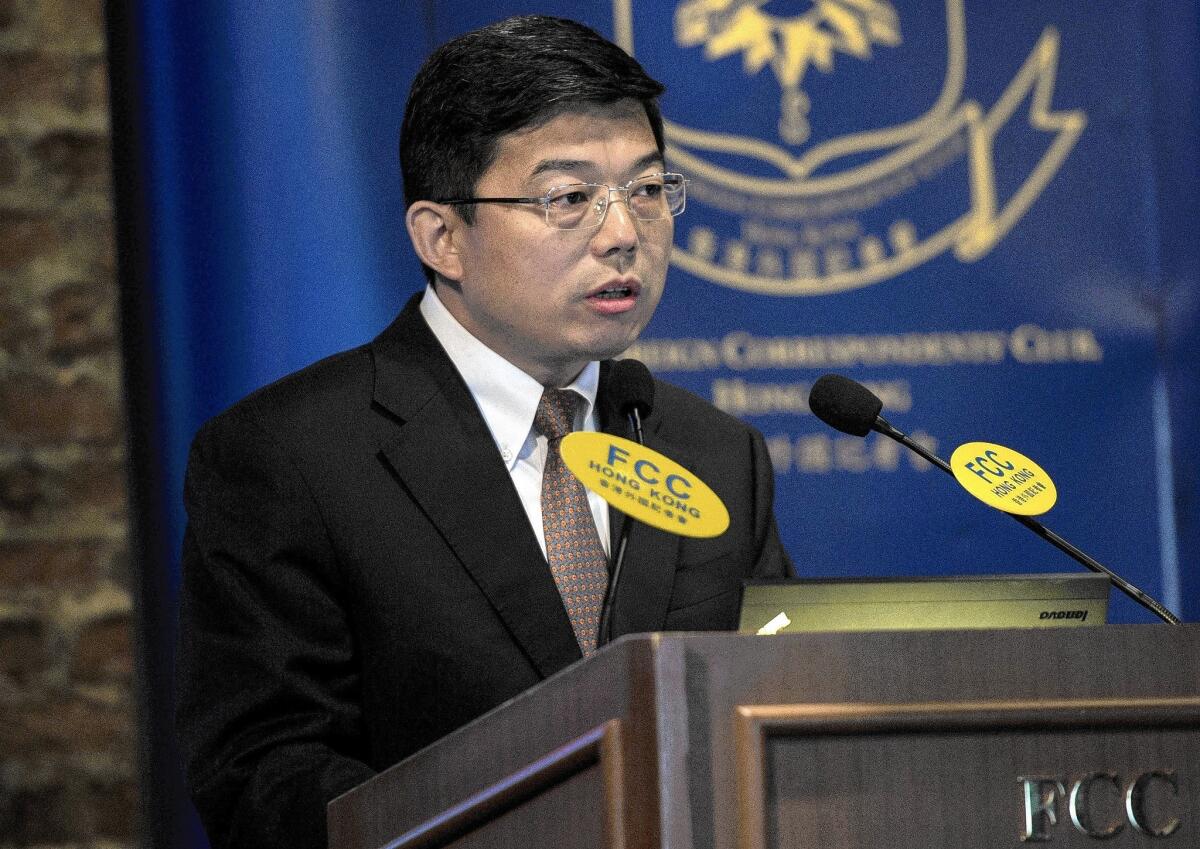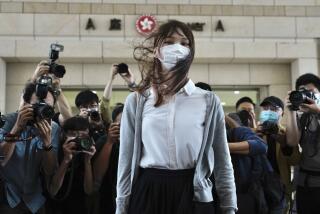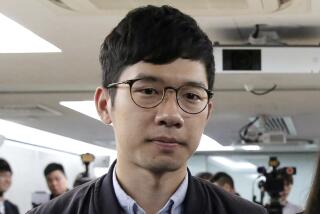Hong Kong protests? They’re foreign to students in Beijing

Luke Li, a 21-year-old studying information technology, might seem like just the kind of mainland Chinese citizen who would be interested in — and sympathetic to — the Hong Kong college students who have taken to the streets for more than two weeks to press for greater democracy.
A student at Beijing’s top-notch Tsinghua University, often called “China’s MIT,” the computer-savvy Li clearly knows how to skirt China’s intense censorship controls that have limited many people to viewing only approved news reports about the demonstrations. But not only is Li not very curious about the protesters; he’s also against them.
“I’m aware of what’s going on in Hong Kong, but I don’t know too much about it. I don’t support what they are doing,” said Li, echoing state-run media commentary that protesters have exhibited “radical behavior” that will “create social disorder.”
Hong Kongers, Li said, aren’t like mainlanders. “They grow up under a different system, and it is natural their opinions and mentality are different. When they are not pleased with something, they organize things like Occupy Central. When we are not pleased with something, we discuss it through the Congress,” he said, referring to the National People’s Congress, China’s rubber-stamp legislature.
Though the vast majority of college students in China today cannot recall a time when Hong Kong was not officially part of China — the former British colony returned to Chinese rule in 1997 under a framework known as “one country, two systems” — many say the semiautonomous “special administrative region” remains, in ways large and small, a place as alien and different to them as any foreign nation.
Hong Kongers, they note, are much wealthier and have personal freedoms and privileges — not to mention better goods and services — that mainlanders can only dream about.
Although gauging public opinion can be tough in the communist-run mainland because many people are wary of discussing sensitive topics such as democracy, interviews with more than a dozen college students in Beijing in recent days turned up just two young men who voiced strong backing for the Hong Kong protests. A majority expressed opinions ranging from vague indifference to disapproval.
“I don’t support the Hong Kongers,” said Wang Ning, a 19-year-old majoring in finance at People’s University. “They definitely enjoy more privileges; otherwise why would so many mainlanders go to Hong Kong to give birth to their babies?”
Reminders of Hong Kong’s lingering foreignness are everywhere in mainland China, starting at the airport. Travelers flying from Beijing to Hong Kong, for example, don’t follow terminal signs for domestic carriers, but instead are directed to the entrance for “Hong Kong, Macau, Taiwan and International Flights.”
To travel to Hong Kong, mainland Chinese must apply for a special travel pass and a visa that allows them to visit for just 14 days at a time. (Americans, by contrast, can fly to Hong Kong without obtaining a visa and they can stay for 90 days. It’s also much easier for Hong Kong residents to visit, and work, in the mainland.)
Once in Hong Kong, mainlanders must exchange their Mao-faced renminbi bills for Hong Kong dollars, which are decorated with lions and images of local bank buildings, rather than the great communist helmsman’s visage.
Hong Kong has two official languages, Chinese and English, but locals converse overwhelmingly in the Cantonese dialect, which can be nigh impossible for many Mandarin speakers to understand. And Hong Kongers use traditional Chinese characters to write, rather than the simplified version adopted in the mainland starting in the 1950s to boost literacy rates.
Hong Kongers celebrate many of the same holidays as mainlanders, but also get days such as Christmas and Good Friday off, Christian celebrations barely acknowledged on the mainland, let alone officially sanctioned.
And the territory’s residents even drive on the other side of the road, the left, a la Britain.
For the tens of millions of mainlanders who visit Hong Kong annually, the territory is a shopper’s paradise, offering products unavailable at home. Hong Kong prices are lower for many imported products for a variety of reasons, including the fact that the currency is pegged to the U.S. dollar, and the territory has lower tariffs than the mainland.
Last month, gray marketeers swamped Hong Kong, buying up the newest version of the iPhone to resell on the mainland while Apple was still waiting for licensing approval from telecommunications authorities in Beijing.
Hong Kong offers much greater freedom of speech than the mainland, so many visitors buy books and other publications that are banned at home. Others, fearful of repeated tainted food scandals on the mainland, snap up products such as European-made baby milk powder. So many mainlanders come to Hong Kong to buy baby milk powder that the territory’s government now limits visitors to about 4 pounds per person; signs at the airport warn of high fines for those trying to fly out with more.
“Most of my classmates don’t pay so much attention to the protest, because Hong Kong is very far away from us,” said a senior majoring in Japanese at Beijing Foreign Studies University who would give only her first name, Mia. “Hong Kong is very Westernized. Their political system is different from the mainland and the language is also different.”
Many of the students interviewed used adjectives such as “prosperous,” “modern,” “open” and “free” to describe Hong Kong, though only one had ever visited.
“It is quite nice, unlike Beijing, which is always smoggy,” Hao Xinze, a 21-year-old from Inner Mongolia who dropped out of college to start a software business. “I think people protest over issues in Hong Kong and other countries, but our policy doesn’t allow such things in mainland China.”
Rocky Ma, a member of the Hui ethnic minority from Ningxia province, was one of two students at Minzu University who expressed strong support for the Hong Kong students. “I know people in Hong Kong are fighting for the rights of universal suffrage,” he said. “I totally support their movement because I major in history. I can understand why they have such demands.”
Nevertheless, Ma was pessimistic about the chances of the protests succeeding. “I don’t think the Chinese government will make any compromises with the students in Hong Kong, because the political system here is a dictatorship, and under a dictatorship, the government is not voted by ordinary people; they just took over the country through war. So they’ll do everything they can to try to protect the power they have obtained.”
Leo Liu, a graduate student in anthropology, was equally enthused about the protests.
“I think it’s amazing for them to be able to go into the streets and express their opinion,” said Liu, 24, who has been using Instagram to keep tabs on developments and a virtual private network service to leap over the so-called Great Firewall to read uncensored reports. “I’ve lived in China for over 20 years,” he said. “I don’t know anything about freedom.”
Liu glanced over his shoulders, pointing to a security camera nearby, a common sight throughout Beijing. “I hope Big Brother is not watching or listening to me,” he said, only half-joking. “I’ve seen videos online about what happened in Tiananmen Square [in 1989]. I’m not sure what the police or army might do.”
Liu said he didn’t know whether authorities were very worried that mainlanders might copy their Hong Kong cousins if they saw too much about the protests.
“But the one-party system in China is really too powerful,” he said. “That’s why I think the students in Hong Kong are really brave.”
Tommy Yang, Nicole Liu and Sean Silbert of The Times’ Beijing bureau contributed to this report.
More to Read
Start your day right
Sign up for Essential California for news, features and recommendations from the L.A. Times and beyond in your inbox six days a week.
You may occasionally receive promotional content from the Los Angeles Times.







